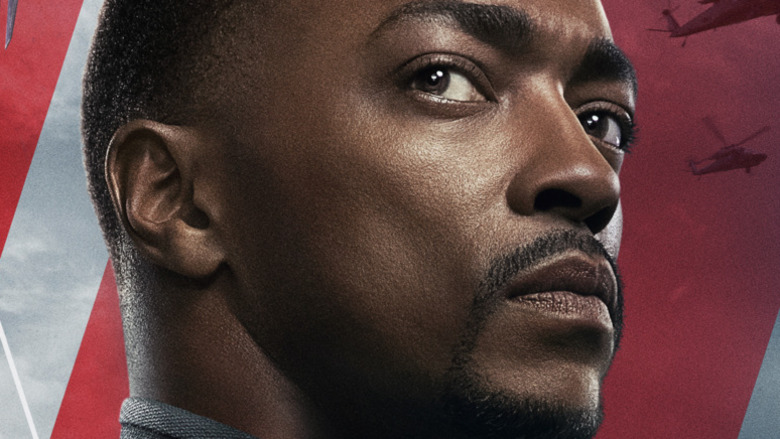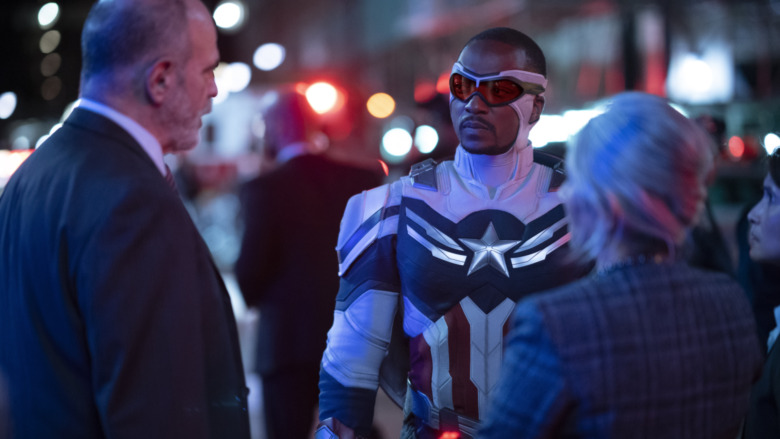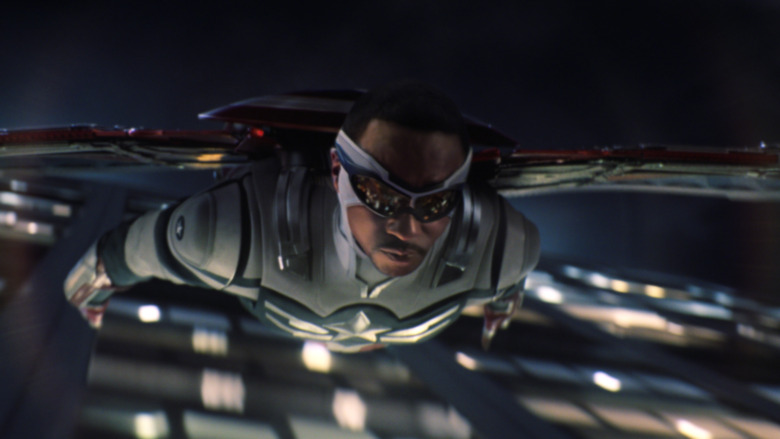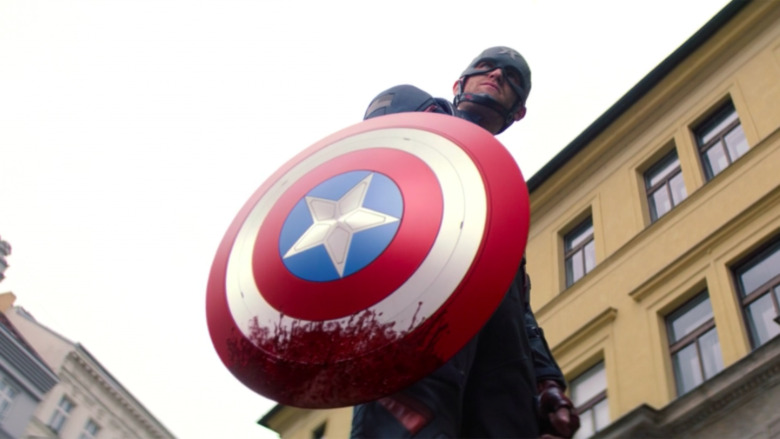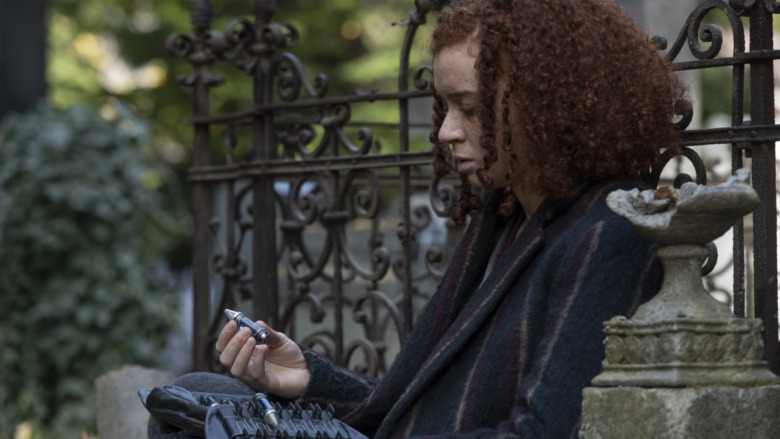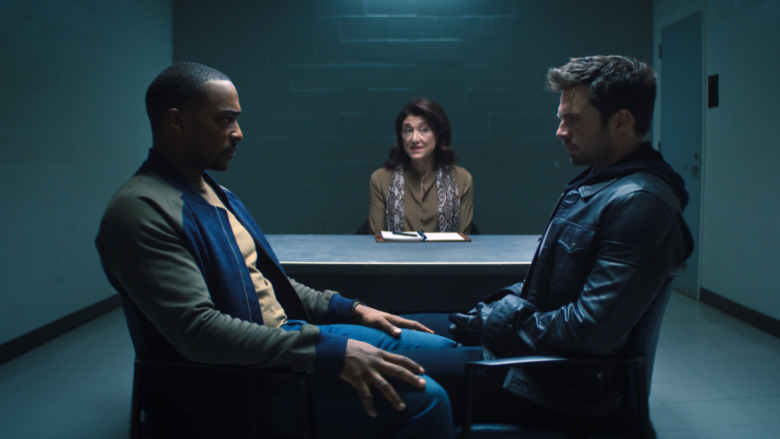The Falcon And The Winter Soldier Director Kari Skogland Talks Fan Theories, Captain America's Iconic Speech, And More - Exclusive Interview
Major spoilers for "The Falcon and the Winter Soldier" finale.
Ever since the epic "The Falcon and the Winter Soldier" finale hit Disney+, fans have been reeling from the explosive bombshells. The series, which played a significant part in defining Phase 4 of the MCU, is just the beginning of what's in store for Anthony Mackie's Sam Wilson (now Captain America) and Sebastian Stan's Bucky Barnes. Of course, at the forefront of all of our favorite scenes was director Kari Skogland, whose keen eye and attention to detail made "The Falcon and the Winter Soldier" what it is.
With experience on shows like "Vikings," "The Walking Dead," "The Handmaid's Tale," and "NOS4A2," Skogland is used to working on series with a myriad of subjects, time periods, and genres, making her the perfect director to helm all six episodes of "The Falcon and the Winter Soldier." After all, with a slew of flashback sequences, wild battles, and some pretty epic heart-to-hearts, the show covers the whole map of possibilities. Skogland was undeniably up for the challenge, and the final result is breathtaking in every way imaginable.
Looper spoke to Kari Skogland for an exclusive interview, in which she opened up about everything from Sam's groundbreaking speech as Cap to the virus theory fans were cooking up even before "The Falcon and the Winter Soldier" debuted.
A Captain America for the times
So Sam's speech as Captain America in the final episode is absolutely incredible. What was that scene like to film, and did Anthony Mackie have any input on how that came together?
Yes. Anthony and [creator] Malcolm [Spellman] worked together [for] quite a long time to get that speech right. Obviously, it moved us into many of the themes that we had been exploring throughout the series, so it had to be just right — and it was in a way a rally cry, but not in the traditional classic sum-up speech. So what I think we all wanted it to do was to open doors. As we had explored these themes of racism and elitism and imperialism, all the isms, but most importantly racism, we were not going to be able to tie this up in a nice, neat little bow, and we didn't want to.
We really wanted it to open the door of discussion, [to] continue that ongoing discussion that must always be present as we go down different roads, as we opened doors to different ideas so that where diversity is top of mind, responsibility to [the] community is top of mind. He literally says, "You can do better." And literally, he says, "You've got the power, now what are you going to do with it?" and opens those questions instead of trying to give them answers.
Definitely.
It's really about igniting the personal responsibility that we all have to the community. And I think that's, as a result, an extraordinary speech. So yes, Anthony was a big part of that.
Cap soars like an eagle (or falcon)
It's really exciting to see Sam embracing his role as Captain America but not entirely giving up Redwing. Anthony Mackie told me in October that he feels so much legacy in Falcon as a character and that it would be difficult for him to see someone else take up that mantle. Did he have any say in the decision to keep his wings for the time being, and how did that decision sort of come about?
I think it was always that he would be Captain America with wings. Now, of course, they're new wings. They were Wakandan. It's a Wakandan suit, so it's coming from a slightly different tech place. He's not a super-soldier, so in order to be Captain America ... who that needs to be as a hero for the future that's relevant to our times, the wings are going to help him out because he can do things that Captain America, [that] Steve couldn't do. He's up in the air, so he has a whole other ... Not to mention he can do, if you remember, through some of his training, we had him ... We wanted him to be able to do extraordinary things with the shield so that he uses his body in a way that is very athletic, and he can do another set of extraordinary things as a human, as a sort of very fit, and I guess, extraordinary human nonetheless.
The MCU's most chilling moment
I'm still blown away by the sequence when the camera tilts on Cap's bloody shield after John uses it to kill. What did the conversation surrounding that scene look like, and how did you get to that final captivating image?
Well, we always wanted it to be gruesome. I think obviously we are in the PG-13 space, so a bit of less-is-more, but I wanted it all to be imagined because in the imagination of it, you fill in the blanks, and that can be whatever level of horror you want it to be — but it will be horrible. I also wanted it to be experiential so that it was a bit more of a ballet in that once we see John losing his mind, we kind of go into his space, which is why the super slow motion and the quick cuts and the slightly out of body experience.
Because I wanted us to really feel the way he was feeling, which was without any control. Then as he sort of wakes up from that red light moment, he realizes what he's done, and we realized what he's done, and so then the iconic moment of that sort of hero angle with the shield close to us, but now stained.
Did the OG script have a virus?
So, there's a rumor going around that the original iteration of "The Falcon and the Winter Soldier" hinged on a virus, but the pandemic caused rewrites. Is there any truth to that, or did the series face any other rewrites or changes because of COVID?
No, none of that's true. We were well on the road to this story as you see it. We'd shot about 75% when we had to shut down for a couple [of] months. There was no pandemic in our story at all — ever. So we shut down [and] we went right into post-production with the footage we had, which was pretty much the series. I think there was one particular episode that we hadn't yet shot a lot of, which might've been episode four, I guess, ish, because a lot of that was set outside of the country. I think we sharpened our pencils for the story of it because we now knew the characters. We knew who John Walker needed to be because we had really looked for the tone of his character.
We tried a few different things because we weren't entirely sure how he ... what was going to be the best version of him. So we opened it up to, in terms of just each scene, experimented with totally shifting him — sometimes a little funny or sometimes a little more heartfelt so we could calibrate it in post — but by the time we'd finished that, we knew exactly what we wanted of him. We felt very secure that we knew what we were shooting, so those were the kinds of, sort of sharpening the pencil.
Ad-libbing and couples therapy
Amy Aquino teased some behind-the-scenes shenanigans during that couples therapy scene. Can you remember anything specific that went down there, and what was it like to sort of get Sebastian and Anthony back on track when they were goofing off a little bit?
Well, what's really fun about the two of them is they have a deep friendship from the past, and so they bring that to every scene. And they also bring a real sense of humor, just a natural sense of humor. So they do tend to love to goof around. But what I love to do is capture it on film ... That scene was really pivotal, and we went into it a bit nervous because we didn't have it fully nailed down, and we weren't sure which way [it would go]. They did quite a bit of ad-libbing. We had a framework for the scene. We obviously had a script, but we then went off script and so what you see is us capturing a lot of what they brought to it, knowing what it needed to do, but allowing the characters just to speak through it versus what was on the page and [that's] what I really loved.
We were very worried about how it was going to calibrate, but when Bucky switches, and he says, I guess Sam says, "What is it to you? What is it any of your business?" And he switches to be quite vulnerable, and we see for the first time, this is a man who's lost. He says, "If Steve was wrong about you, what if he was wrong about me? That's how I'm seeing the world right now. I don't know who I am. I don't know where I'm going." And that's what made that scene so supercharged, because on the one hand, it was quite funny and ironic and kind of goofbally, and then the staring contest of it was a brilliant, I mean, the writer, it was a brilliant idea. But then it switches, and that's what great drama and comedy [are]. It bounces back and forth.
Definitely, that scene broke me.
All episodes of "The Falcon and the Winter Soldier" are available on Disney+.
